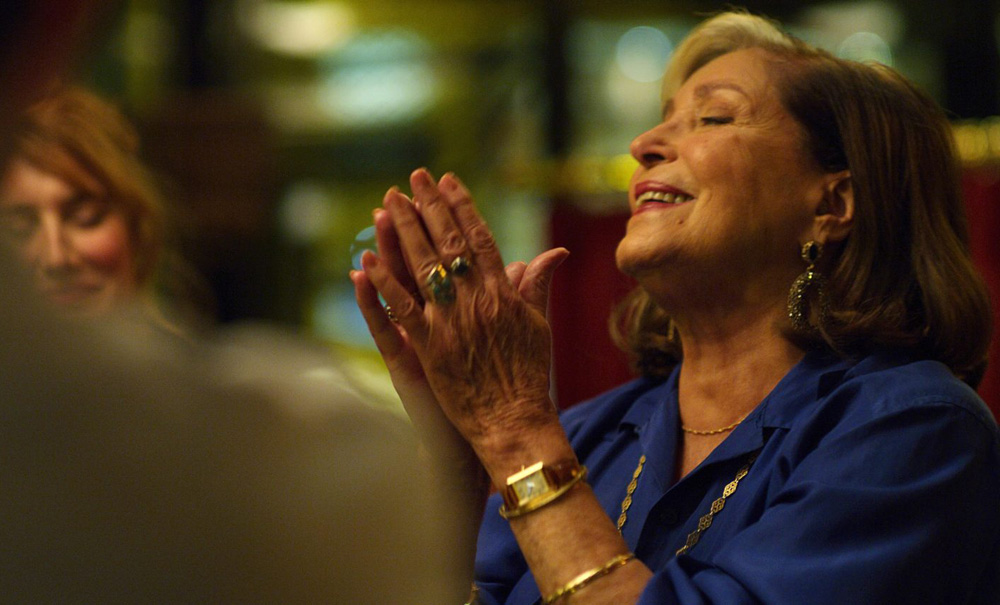Aurelie Saada knew that some people save the best for later, which is why she was inclined to leave a little treat at the end of her feature debut “Rose.”
“If [people] stay until the end, it’s in French, but there is the recipe of the macaroon of my grandma,” Saada said, though it’s likely no one will need such incentive given the overall charm of her drama. “I hope it leaves people with a smile.”
Saada was thinking about the women in her life in general when it came to “Rose,” a lovely portrait of a recent widow who slowly starts to adjust to life on her own. Starring Françoise Fabian as the septugenarian who has no one idea who she is at first without her late husband Phillippe by her side. Her children Sarah (Aure Atika), Pierre (Gregory Montel) and Leon (Damien Chapelle) have their own lives to worry about, and any attempts at reaching out seem futile anyway when Rose is too overcome with grief and leaving a message on her answering machine does not one any good. However, an invitation to a dinner party thrown by Sarah begins to lure Rose out of her shell, as cloistered as a big social gathering seems at first, and she’s awakened to the possibilities of a life around her that she didn’t think much about while she was with her husband, including a burgeoning relationship with the owner of a local restaurant.
It may be Saada’s first feature behind the camera, but she’s used to getting people to spring into action as one half of the French pop act Brigitte and she drums up the same excitement that she might at a concert to get Rose back into circulation as her heroine rediscovers her lust for life. The energy may be infectious, but so too is the clearly personal nature of the project as the director considers her own experience of entering her forties and feeling like a forgotten woman, having had the intense experience of being in the public eye for much of her twenties and thirties, and shrewdly giving a rich role to Fabian, the rare actress who was on the sets of Luis Bunuel’s “Belle de Jour” and Lucas Belvaux’s “Rapt” and still has the opportunity to play a character unlike one she’s ever been before.
With “Rose” arriving on American shores this week after first premiering at Locarno, Saada spoke about how she ended up taking control over her own narrative as her main character does in the film as a director, creating a tight-knit family on set and what she could carry over from her musical background to filmmaking and vice versa.
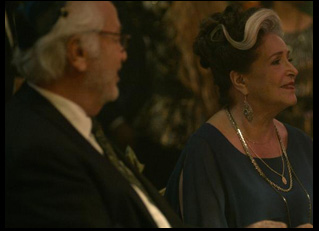
There was a dinner party in my apartment, and I will not say too much because it’s exactly the same scene as in the film, but this dinner party, the real one, gave me the idea [because] when people left my house, I [thought], “Oh, I want to write a film about that.” And the people around the table [in the film], some are actors, but some are not. They are really good friends of mine. I wanted to have something very natural and I worked two days on this scene [during the production] to have something really special. I filmed it during COVID, at a time when people didn’t have the chance to have a dinner party together. It was forbidden, so it was very special for everybody. It was a live moment, full of life and energy, sharing emotions and people talking to one another.
It seems like it may have been intimidating to film when there are so many characters to keep track of, yet you capture the energy of the room. Were big crowd scenes like that a challenge?
I love when there are a lot of people, and I think maybe my experience in music, playing big stages in France, makes me different in front of a big crowd. When I see a lot of people, it’s familiar for me. It’s like, “Okay, you go this way.” It was exciting to have all these people dancing together and trying to find a way to film them with my DOP. “Come on, let’s go this way and this way.” It was a fantastic moment for me. That’s why there are a lot of scenes with a lot of people in this film. Also because I love this generous moment in cinema where there are a lot of people.
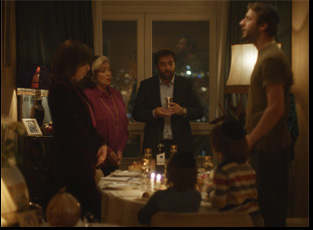
The script was very important for me. I think I write as a musician, so there is a certain rhythm inside the dialogue and I was looking for that. I actually like to write poetry and short stories, and when I had this idea, I thought it wasn’t a song. I wanted to see actors playing this story, so I began to write it. And I remember I had a friend who was a script doctor and I sent the synopsis to her. She was the only one I knew who worked in cinema, and I said, “Do you think it can be a film or should it go in the trash?” And she said, “Oh no, it’s a film, of course! And if you want, I can help you. I really love this idea.” And I said, “Okay, if I have the blessing of my friend, I will do it.”
So [when we got to set, the actors] knew they have to know by heart all the things that I’ve written, but then after, when the scene was finished, I let them improvise. They really loved each other. There was something of a family that was beginning to happen between them, so I felt it was important to try this and they gave me a lot. After that, it was a real family and while we were doing the film, they were organizing family dinners. I was like, “Oh!” And sometimes I was invited and they would say, “Are you sure you don’t want to stay?” [And I thought] the family maybe wants to stay together without the director and they were like, “No, you have to come.” So it was funny. They loved each other like a family.
I don’t know if your sister cooked for them off-set, but I heard she did on and made all the delectable food for the film. What was it like to bring her aboard?
Food was very, very important in the film and I don’t like when actors fake to eat food. It’s like dancing. It’s important that they really live the thing, so I asked my sister to cook. She is an amazing chef and I was sure that they would love [the food] and they will really eat, so it would be a very natural scene of a dinner party. And it happens. When we shot the dinner, they ate so much that at the end when we had to do the scene again, there was not enough food. So she went back in the kitchen and cooked again. It was so funny.
I hope you didn’t make them do too many takes.
No, that’s why. At the end, I was like, “Come on, you don’t eat too much.”
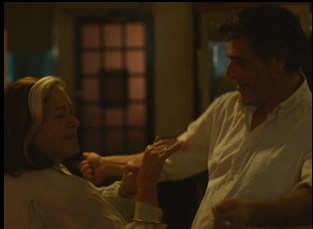
It was so moving because I’m a huge fan of her. She’s the most beautiful actress and her career is amazing, so to have the chance to work with her was amazing for me. She was 88 when we were shooting the film and the cinema doesn’t give her [good] characters. At that time of an actress’ life, you just play the funny or the mean grandma, but I wanted to have a woman who still has desire and be desired, who reconquered her life and is really alive, so it was important for me that my main character was a woman of this age. And it wasn’t easy at the beginning to convince people who [financed] the film to have an actress of this age, but it was very, very important for me because I knew that it was also an idea about the society that was important for me.
It’s really something I wanted to say about women, about family, about life, about desire, about the fact that life is not over until it’s over. If you have the chance to be on Earth, there is a special fire inside and I wanted to show the special fire that this woman has inside of her — that she didn’t expect because she thought that her life was behind her and I wanted to share something really about joy.
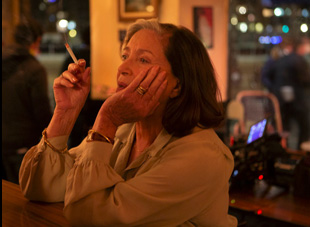
At the beginning, I actually thought I will not do the music for the film because I thought writing the script and directing the film, maybe it’s enough. I will ask someone else to do the music. But as I was working on it, I [thought], I have too many ideas in my head and I want something special. All the details of the film were really, really, really special for me and it’s very autobiographical in a way. There are a lot of details of my real life, or my family, and things that are important for me, so I thought I’m going to write the music and the songs for the film in all the languages [of countries] that my family is from. So I wrote in Italian, in Arabic, in Hebrew, in French, and I worked with a good friend, Thomas [Dutronc], who has a band [that plays] Kleszmer [like music] and plays a lot of Arabic instruments. He worked with an Algerian singer and it was amazing for me to do this and to connect with the music of my origins.
Was directing satisfying when you’ve had so many artistic pursuits?
Yeah. Doing a film is working on everything, but also it’s not your film. Doing a film is the film of 300 people, because it’s a big team. You don’t make a film alone. You make a film with 300 people, actors, technicians, producers. It’s a big, big boat. It’s very different from music. You are alone with two or three people, but most of the time, for music, you can do it alone if you want and it was an amazing experience [on this film] to share this energy with all those people that I loved so much.
“Rose” opens on January 24th in Los Angeles at the Laemmle Royal and New York at the Quad Cinema before expanding across the country. A full list of theaters and dates is here.




